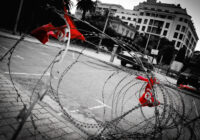The significance of the Israeli-Palestinian battle being fought on the soccer pitch goes beyond the intricacies of Middle Eastern politics.
The perennial dispute between Israel and Palestine has put world soccer body FIFA in a bind. With FIFA groping on how to deal with Israeli West Bank settlement teams playing in Israeli leagues in violation of the soccer body’s rules, FIFA seems doomed if it does and doomed if it doesn’t.
A draft report by a FIFA committee headed by veteran anti-apartheid activist and former FIFA presidential candidate Tokyo Sexwale offers the soccer body’s governing council and congress, which meet in Bahrain this week, three imperfect options: allow the status quo to continue; give Israel six months to rectify the situation; or continue talks between the Israeli and Palestinian soccer federations. The report, an effort to head off yet another attempt by the Palestine Football Association (PFA) to persuade the FIFA Congress to suspend six West Bank settlement teams, if not Israeli membership, is itself a reflection of the Israeli-Palestinian battle. Israel successfully lobbied to ensure that the committee’s recommendations would not include suspending Israeli membership.
Caught in a catch-22, FIFA has yet to formally put the issue on either the agenda of its May 9 governing council meeting or the May 11 congress in Bahrain. Sexwale’s committee meets hours before the council convenes, after which FIFA may as yet put Palestine formally on the agenda.
THE TRUMP ADMINISTRATION
The dispute over the Israeli settlement teams constitutes a litmus test of FIFA’s newly found commitment to human rights, at a time it is trying to project itself as a reformed organization that is putting behind it the massive corruption scandals that have enveloped it for the past six years. Yet those scandals are FIFA’s Achilles’ heel. Any decision that FIFA would take that explicitly or implicitly condemns Israeli settlement policy toward the Occupied West Bank could put it at odds with the Trump administration, which is a stark supporter of Israel and believes it can move the Israeli-Palestinian dispute toward a resolution where others have failed.
Provoking the ire of the Trump administration is not something FIFA would likely want to do after the US Department of Justice recently indicted Richard Lia, the latest of a host of FIFA officials to be charged in the United States on corruption-related offenses. The indictment demonstrated that the Trump administration has every intention to take forward the FIFA cases, initiated under the Obama administration. The US legal proceedings forced FIFA council member Sheikh Ahmad al-Fahad al-Sabah, a member of the Kuwaiti ruling family and one of the most powerful men in international sports, to resign earlier this month. Sheikh Ahmad retains his seat on the International Olympic Committee (IOC), as well as his presidency of the Olympic Council of Asia and the Association of National Olympic Committees (ANOC).
Doing nothing could prompt the FIFA Congress to move on a longstanding Palestinian demand that the soccer body suspends six Israeli settlement soccer teams at the core of the dispute. That would amount to FIFA acknowledging international law, which views Israeli settlements in occupied territory as illegal and put it at odds with the Trump administration. The same is true for giving Israel six months to mend its ways.
In his report, Sexwale asserted that further talks which have dragged on for years without bringing the parties any closer to a resolution would be “futile.”
The stakes are high not just for FIFA, but also Israel and Palestine. Palestine, like FIFA, is walking a tightrope. Palestine will not want to upset the Trump administration less than two weeks after President Mahmoud Abbas, on a visit to Washington, endorsed Donald Trump’s peace-making efforts and in advance of the US president’s visit later this month to the Middle East. At the same time, Abbas cannot be seen to be endorsing or closing his eyes to violations of FIFA rules against the backdrop of a hardline Israeli government that has stepped up its campaign to portray the Palestinian Authority as supporting terrorism.
SPORTS AND POLITICS
That campaign affects not only Abbas, but also the Palestine Football Association (PFA) president, Jibril Rajoub, a former security chief who spent 17 years in prison and hopes to succeed Abbas as president.
Pro-Israeli groups, including the Israel Institute for Strategic Studies, headed by Shabtai Shavit, a former head of Mossad, the Israeli intelligence service, have launched a campaign under the motto, Kick Terrorism Out of Football. The campaign is part of a key Israeli foreign policy goal to counter a growing boycott, divestment and sanctions (BDS) movement that seeks to pressure Israel to withdraw from the Occupied Palestinian Territories. Israel sees the movement as a major threat to its international and moral standing.
The Israeli effort has prompted the government to redefine the concept of a homeland for the Jews as a homeland for those that stand by it uncritically. The government has barred Jewish BDS supporters from entering Israel; persuaded Americans for Peace Now, a Jewish group critical of Israel that does not endorse BDS, not to take the risk of bringing groups to Israel; and led to the expulsion on technical grounds of a Dutch foreign correspondent. Derk Walters of NRC Handelsblad was refused accreditation in part because of his reference to Palestinians with Israeli citizenship as Palestinian rather than Arab Israelis. Israel uses the phrase “Arab” to camouflage the Palestinian identity of approximately 20% of its population.
In a letter to FIFA, the Kick Terrorism Out of Football campaign accused Rajoub of having exploited “football for the promotion of terrorism” for the past 15 years. The campaign charged that Jibril, by naming tournaments in honor of Palestinians who had committed acts of violence against Israel dating back to the 1972 Munich Olympic Games, had violated FIFA rules and encouraged political violence. It demanded that Rajoub be barred. The Israeli view was echoed in a recent op-ed in The Washington Post, in which novelist and New York University law fellow Thane Rosenbaum argued that the Palestinian Authority continued to endorse violence by supporting the families of Palestinians who had died in violent acts against Israel.
 The Israeli campaign against Rajoub as well as the Palestinian Authority is designed not only to counter BDS, but to refocus debate on Palestinian violence at a time that criticism of Israeli settlement policy is mounting in the international community and Trump gears up for a renewed peace effort.
The Israeli campaign against Rajoub as well as the Palestinian Authority is designed not only to counter BDS, but to refocus debate on Palestinian violence at a time that criticism of Israeli settlement policy is mounting in the international community and Trump gears up for a renewed peace effort.
FIFA is the first international forum since the United Nations Security Council condemnation of Israeli settlement policy in December 2016 in which the Israeli campaign is playing out. With the backing of the Trump administration, Israel has greater flexibility than either Palestine or FIFA.
The significance of the Israeli-Palestinian battle being fought on the soccer pitch goes beyond the intricacies of Middle Eastern politics. It demonstrates the knots in which international sports ties itself by continuously upholding the fiction that sports and politics are separate. The battle in FIFA is about politics, not soccer.
The views expressed in this article are the author’s own and do not necessarily reflect Fair Observer’s editorial policy.
Photo Credit: Joel Carillet
Support Fair Observer
We rely on your support for our independence, diversity and quality.
For more than 10 years, Fair Observer has been free, fair and independent. No billionaire owns us, no advertisers control us. We are a reader-supported nonprofit. Unlike many other publications, we keep our content free for readers regardless of where they live or whether they can afford to pay. We have no paywalls and no ads.
In the post-truth era of fake news, echo chambers and filter bubbles, we publish a plurality of perspectives from around the world. Anyone can publish with us, but everyone goes through a rigorous editorial process. So, you get fact-checked, well-reasoned content instead of noise.
We publish 2,500+ voices from 90+ countries. We also conduct education and training programs
on subjects ranging from digital media and journalism to writing and critical thinking. This
doesn’t come cheap. Servers, editors, trainers and web developers cost
money.
Please consider supporting us on a regular basis as a recurring donor or a
sustaining member.
Will you support FO’s journalism?
We rely on your support for our independence, diversity and quality.






